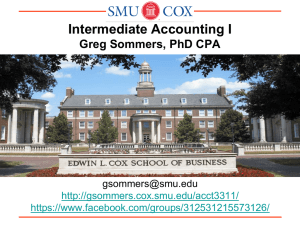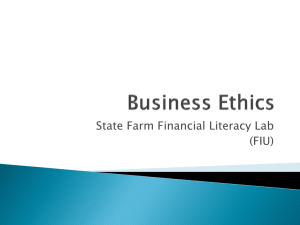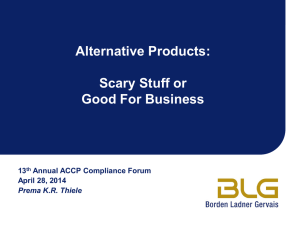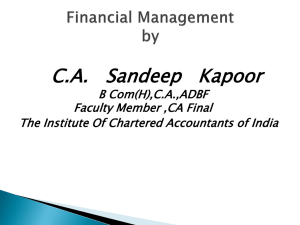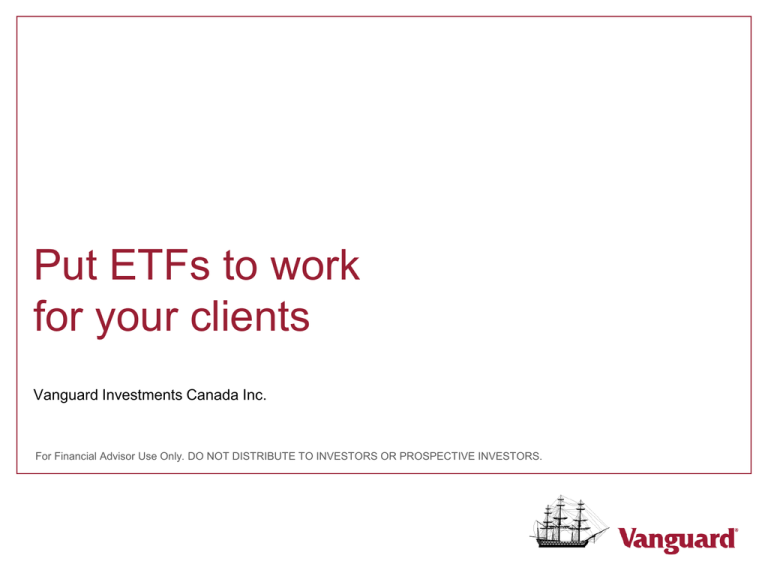
Put ETFs to work
for your clients
Vanguard Investments Canada Inc.
For Financial Advisor Use Only. DO NOT DISTRIBUTE TO INVESTORS OR PROSPECTIVE INVESTORS.
Agenda
• What are ETFs?
• Potential benefits of ETFs
• How ETFs work
• ETFs and indexing
For Financial Advisor Use Only. DO NOT DISTRIBUTE TO INVESTORS OR PROSPECTIVE INVESTORS.
1
What are ETFs?
Index fund
Diversified
Low cost
Low turnover
Individual stock
ETF
Continuously priced
Liquid
For Financial Advisor Use Only. DO NOT DISTRIBUTE TO INVESTORS OR PROSPECTIVE INVESTORS.
2
What are ETFs?
Most exchange-traded funds…
ETFs
seek to track
an index
For Financial Advisor Use Only. DO NOT DISTRIBUTE TO INVESTORS OR PROSPECTIVE INVESTORS.
3
but trade
like a stock
Potential benefits of ETFs
• Low costs
• Diversification
• Trading flexibility
• Liquidity
• Transparency
• Potential for tax efficiency
For Financial Advisor Use Only. DO NOT DISTRIBUTE TO INVESTORS OR PROSPECTIVE INVESTORS.
4
Potential benefits of ETFs
• Low costs
• Diversification
• Trading flexibility
• Liquidity
• Transparency
• Potential for tax efficiency
Costs can be less than those
of conventional index funds
and active funds
For Financial Advisor Use Only. DO NOT DISTRIBUTE TO INVESTORS OR PROSPECTIVE INVESTORS.
5
Potential benefits of ETFs
• Low costs
• Diversification
• Trading flexibility
• Liquidity
• Transparency
• Potential for tax efficiency
Index funds invest in all or a
representative sample of the
securities in an index
For Financial Advisor Use Only. DO NOT DISTRIBUTE TO INVESTORS OR PROSPECTIVE INVESTORS.
6
Potential benefits of ETFs
• Low costs
• Diversification
• Trading flexibility
• Liquidity
• Transparency
• Potential for tax efficiency
Bought and sold any time the
stock exchange is open
For Financial Advisor Use Only. DO NOT DISTRIBUTE TO INVESTORS OR PROSPECTIVE INVESTORS.
7
Potential benefits of ETFs
• Low costs
• Diversification
• Trading flexibility
• Liquidity
• Transparency
• Potential for tax efficiency
Dealers can create and redeem
ETFs as necessary
For Financial Advisor Use Only. DO NOT DISTRIBUTE TO INVESTORS OR PROSPECTIVE INVESTORS.
8
Potential benefits of ETFs
• Low costs
• Diversification
• Trading flexibility
• Liquidity
• Transparency
• Potential for tax efficiency
Information provided
to the market daily
For Financial Advisor Use Only. DO NOT DISTRIBUTE TO INVESTORS OR PROSPECTIVE INVESTORS.
9
Potential benefits of ETFs
• Low costs
• Diversification
• Trading flexibility
• Liquidity
• Transparency
• Potential for tax efficiency
Minimized capital gains distributions
For Financial Advisor Use Only. DO NOT DISTRIBUTE TO INVESTORS OR PROSPECTIVE INVESTORS.
10
How ETFs work
• Creation and redemption
• Secondary-market trading
• Trading options
• Costs
• Excess return and tracking error
• Liquidity and average daily volume
For Financial Advisor Use Only. DO NOT DISTRIBUTE TO INVESTORS OR PROSPECTIVE INVESTORS.
11
How ETFs work
• ETF creation / subscription — delivering a basket of specified securities to the issuer
in return for ETF shares
• ETF redemption — delivering ETF shares back to the issuer in return for a basket of
specified securities
• PCF (or ―the basket‖) — portfolio composition file—the file transmitted daily to
authorized participants / Dealers that lists the securities they must deliver to create
Vanguard ETFs, or the securities they will receive when redeeming Vanguard ETFs
• In-kind redemption — process in which redemptions are paid in shares of the fund’s
underlying stocks—in-kind redemptions do not trigger a taxable gain or loss, unlike
cash redemptions
For Financial Advisor Use Only. DO NOT DISTRIBUTE TO INVESTORS OR PROSPECTIVE INVESTORS.
12
How ETFs work
Creation and redemption
Hold
shares
Basket of securities
ETF
sponsor
Dealer
(certain institutional
investors, such as
brokerage houses)
One creation unit
(e.g., 50,000 shares of ETF)
Individual
investors
Trade on
Toronto
Stock
Exchange
ETF redemption works in reverse, with the dealer providing ETF shares to the ETF sponsor in return for underlying securities.
For Financial Advisor Use Only. DO NOT DISTRIBUTE TO INVESTORS OR PROSPECTIVE INVESTORS.
13
How ETFs work
Lead market maker / Specialist / Designated liquidity provider / Designated Broker
• Exchange registered traders assigned to an ETF
• Obligated to provide liquidity and maintain a fair and orderly market for
their ETFs
• Typically provide seed capital
Authorized Participant / Underwriter / Dealer
• An institution that has signed a contract with Vanguard for the ability to
create and redeem shares of Vanguard ETFs
Market Maker / Market Maker
• Exchange registered traders who provide additional liquidity through
two-sided quotes
For Financial Advisor Use Only. DO NOT DISTRIBUTE TO INVESTORS OR PROSPECTIVE INVESTORS.
14
How ETFs work
Other traders provide additional sources of liquidity
• Prop desks and institutional traders; high volume and high frequency traders
• Not obligated to make markets and usually provide one-sided quotes
Exchange
• Provides or maintains the marketplace where ETFs can be traded from one investor
to another (e.g. TSX, Alpha, NYSE, LSE)
Alternative trading systems (ATS)
• Facilitate high velocity, low-latency trading of listed equities on an exchange (e.g.
Alpha, BATS, CHI-X)
For Financial Advisor Use Only. DO NOT DISTRIBUTE TO INVESTORS OR PROSPECTIVE INVESTORS.
15
How ETFs work
Secondary-market trading
Investor
A
Works with advisor to
create an investment mix
that’s right for him or her.
Works with advisor to
create an investment mix
that’s right for him or her.
Investor
B
Advisor
A
Broker
A
Stock
exchange
Broker
B
Advisor
B
Places “buy”
order for ETF
shares on behalf
of Investor A.
Initiates
transaction with
stock exchange.
Completes transaction
with brokers. Share
ownership changes
from Investor B to
Investor A.
Initiates
transaction with
stock exchange.
Places “buy”
order for ETF
shares on behalf
of Investor B.
For Financial Advisor Use Only. DO NOT DISTRIBUTE TO INVESTORS OR PROSPECTIVE INVESTORS.
16
How ETFs work
• Creation and redemption
• Secondary-market trading
• Trading options
• Costs
• Excess return and tracking error
• Liquidity and average daily volume
Greater flexibility than
with mutual funds
For Financial Advisor Use Only. DO NOT DISTRIBUTE TO INVESTORS OR PROSPECTIVE INVESTORS.
17
How ETFs work
• All else equal, ETFs will trade with tighter quoted spreads when all of the
underlying securities have begun trading
• When trading size, engage a block desk to review options
• Avoid market orders when possible, particularly at market open and close
For Financial Advisor Use Only. DO NOT DISTRIBUTE TO INVESTORS OR PROSPECTIVE INVESTORS.
18
How ETFs work
• Creation and redemption
• Secondary-market trading
• Trading options
• Costs
Market order – Buying or selling immediately, at market price
• Excess return and tracking error
Stop order – Initiating market order at specified price
Limit order
– Buying
or selling at specified price
• Liquidity and average
daily
volume
Buying on margin – Borrowing from broker
Short-selling – Betting on decline in price
Greater flexibility than
with mutual funds
For Financial Advisor Use Only. DO NOT DISTRIBUTE TO INVESTORS OR PROSPECTIVE INVESTORS.
19
How ETFs work
• Creation and redemption
• Secondary-market trading
• Trading options
• Costs
• Excess return and tracking error
• Liquidity and average daily volume
Generally less than index
and active mutual funds
For Financial Advisor Use Only. DO NOT DISTRIBUTE TO INVESTORS OR PROSPECTIVE INVESTORS.
20
How ETFs work
• Creation and redemption
• Secondary-market trading
• Trading options
• Costs
• Excess return and tracking error
• Liquidity and average daily volume
Helping you evaluate ETFs
For Financial Advisor Use Only. DO NOT DISTRIBUTE TO INVESTORS OR PROSPECTIVE INVESTORS.
21
How ETFs work
• Creation and redemption
• Secondary-market trading
• Trading options
• Costs
• Excess return and tracking error
• Liquidity and average daily volume
Underlying securities matter most
For Financial Advisor Use Only. DO NOT DISTRIBUTE TO INVESTORS OR PROSPECTIVE INVESTORS.
22
ETFs and indexing
The zero-sum game
Costs shift the investor’s
return distribution
Market return
After costs, less value is
delivered to investors
• The holdings of all investors aggregate to form a market
• Outperformance by one necessarily means underperformance by another
• The key to increasing the likelihood of remaining on the winning side is by
lowering costs (but maintaining skill)
Source: The Vanguard Group, Inc. Investment Strategy Group. For illustrative purposes only. This illustration does not represent the return on any particular investment.
For Financial Advisor Use Only. DO NOT DISTRIBUTE TO INVESTORS OR PROSPECTIVE INVESTORS.
23
ETFs and indexing
The Vanguard approach
• Market-capitalization weighting
• Pitfalls of alternative-weighting schemes
For Financial Advisor Use Only. DO NOT DISTRIBUTE TO INVESTORS OR PROSPECTIVE INVESTORS.
24
Supporting your business
ETF product card
Canada website
Plain talk about
how ETFs work
Indexing: Market-cap vs.
alternative website
For Financial Advisor Use Only. DO NOT DISTRIBUTE TO INVESTORS OR PROSPECTIVE INVESTORS.
25
Disclosures
Commissions, management fees and expenses all may be associated with the Vanguard ETFs. This
offering is only made by prospectus. Copies are available from Vanguard Investments Canada Inc.
at www.vanguardcanada.ca. Please read the prospectus before investing. ETFs are not guaranteed,
their values change frequently, and past performance may not be repeated.
Date of First Publication: April 20, 2012. The opinions expressed in this presentation are those of the individual
representative and do not necessarily reflect the opinions of Vanguard Investments Canada Inc. (“Vanguard”). Information
contained herein has been compiled from sources believed to be reliable but Vanguard does not guarantee its accuracy,
completeness or correctness.
This presentation is not intended to be relied upon as investment or tax advice and it is not a recommendation, offer, or
solicitation to buy or sell any ETFs or to adopt any particular investment strategy or portfolio strategy. Presentations are
intended for informational and educational purposes only and do not replace independent professional judgment. This
presentation is not tailored to the needs or circumstances of any individual investor and thus, it should not be used as the
basis of any specific investment recommendation for any individual investor.
No part of this presentation may be reproduced, distributed, disseminated, or referred to, in whole or in part, in any form,
including to any investor, without prior written and express permission by Vanguard.
Notes on risk:
All investments, including those that seek to track indexes, are subject to risk, including the possible loss of principal. Diversification does not ensure a profit or protect
against a loss in a declining market. While Vanguard ETFs are designed to be as diversified as the original indexes they seek to track and can provide greater
diversification than an individual investor may achieve independently, any given ETF may not be a diversified investment.
Investing in ETFs involves risk, including the risk of error in tracking the underlying index. ETFs are subject to risks similar to those of stocks. Investments that
concentrate on a relatively narrow market sector face the risk of higher share-price volatility. Prices of mid- and small-cap stocks often fluctuate more than those of
large-company stocks. Stocks of companies in emerging markets are generally more risky than stocks of companies in developed countries. Investments in exchangetraded bond funds are subject to interest rate, credit, and inflation risk. Foreign investing involves additional risks including currency fluctuations and political
uncertainty.
© 2012 Vanguard Investments Canada Inc. All rights reserved.
EBPC 022012
For Financial Advisor Use Only. DO NOT DISTRIBUTE TO INVESTORS OR PROSPECTIVE INVESTORS.
26


